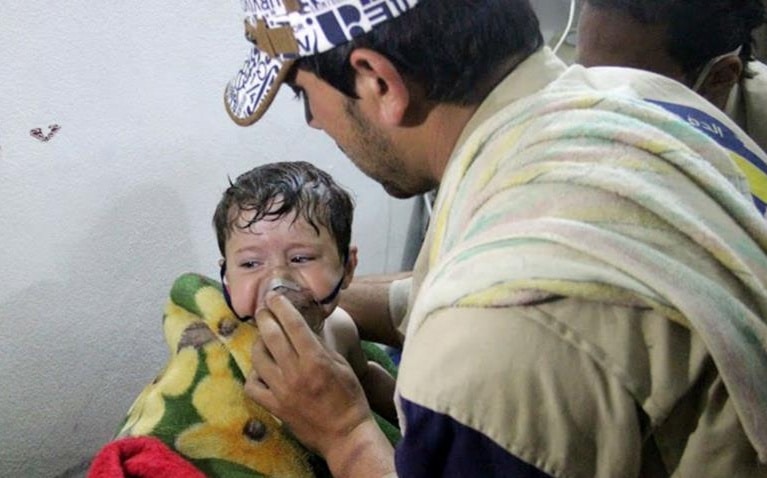A medic treats a young victim after a chemical attack on Latamineh in northwest Syria, March 2018
Ambassador Ahmet Üzümcü, the Director-General of the Organization for the Prohibition of Chemical Weapons from 2010 to 2018, writes for the Council on Strategic Risks:
I watched a few days ago, via webcast, the proceedings of the Organization for the Prohibition of Chemical Weapons Conference of States Parties held in The Hague. The main issue was, again, the use of chemical weapons in Syria. The CSP adopted a draft decision, submitted by western countries in line with the Chemical Weapons Convention, on a measure foreseen against Syria, a member that fails to comply with its obligations.
The draft decision, which was to suspend some rights and privileges, seemed proportionate, even mild considering the issues at stake. States Parties made statements before the voting and as explanations of votes after it. The decision was adopted by the votes of 87 countries, 34 abstained, and 15 voted against. Some representatives left the room before the voting began.
See also OPCW Strips Assad Regime of Rights After Confirmation of Chlorine Attack in NW Syria
Chemical Weapons Watchdog Criticizes Assad Regime Over Undeclared Facility, 18 Other Issues
I have observed that the divisions in the OPCW membership over Syria-related issues, which started during my term as Director General, have become worse. I am saddened and have decided to refresh the memories of all concerned.
I remember my first reaction when the United States and the Russian Federation shared with me in September 2013 the draft decision on the elimination of chemical weapons in Syria, the text of which was later adopted unanimously by the OPCW Executive Council and endorsed the same day by the UN Security Council.
I was at the time not comfortable with a decision inviting a government to become a member with equal rights while it was accused of using sarin, a deadly nerve agent, less than a month before, against its own people. It was estimated that 1,400 people, including women and children, perished in a couple of hours in Ghouta, on the outskirts of Damascus. The Syrian Government denied any responsibility but the use of sarin was confirmed by a mission under the UN Secretary General mechanism and composed mainly of OPCW inspectors.
Nevertheless, I was assured by the proponents of the decision on the elimination of chemical weapons that this would serve the interests of the Syrian people since everything would be destroyed and consequently any further use of chemical weapons would be prevented.
In retrospect, I think that my initial reservations were correct and it was too much of a leap of faith to jump from the “red line” trigger — US President Obama’s warning that Syrian chemical weapon use would be met with consequences — to membership of the OPCW.
Let me explain. I believe a progressive approach should have been adopted under which Syria should have been asked to wait until it had gotten rid of all its CW stockpiles and production capacity in a verifiable manner, and then a reasonable and quiet period allowed to elapse without any reported use of CWs. Although the CWC does not provide a basis for such a transitional arrangement, it could have been executed through a UN Security Council resolution. But the Director General had little influence in decision-making, for that remains the prerogative of Member States.


Despite the questionable findings regarding the use of chlorine in the conflict, the OPCW does not list the gas as a toxic chemical weapon: https://www.opcw.org/chemical-weapons-convention/annexes/annex-chemicals/schedule-1